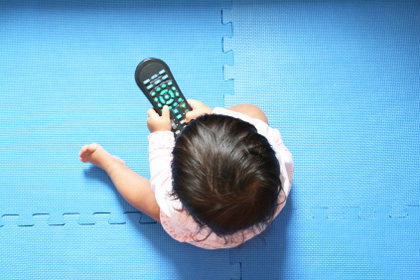 It all began when a father noticed that his 3-month-old seemed mesmerized by the flickering TV screen. "Could this be affecting the baby?" he wondered.
It all began when a father noticed that his 3-month-old seemed mesmerized by the flickering TV screen. "Could this be affecting the baby?" he wondered.
That this father - Dr. Dimitri Christakis - was in a position to search for an answer to his own question may turn out to be a lucky break for the rest of us. His study, "Early Television Exposure and Subsequent Attentional Problems in Children" was published in the April 4 edition of Pediatrics and has been garnering widespread attention ever since.
The study revealed that the amount of TV a child is exposed to between ages 1 and 3 has a direct effect upon later attention problems. Watching television, in other words, can shorten attention spans.
"It's a relative risk," says Christakis, a pediatrician and researcher at Children's Hospital and Regional Medical Center in Seattle. For example, a child who watched two hours of TV a day before age 3 would be 20 percent more likely to have attention problems by age 7, he explains.
Christakis feels television's fast-paced, altering images can overstimulate a young child's brain during a time of rapid development. "There's a certain amount of brain plasticity that exists during the first few years of life," he says. "Early environmental experiences at this time are formative."
Children spend many of their waking hours in front of the television, says Christakis. "They have enormous exposure to something we really know very little about."
The study looked at data on more than 1,300 children who took part in a government survey of children and youth. Their parents answered questions about their children's TV watching at ages 1 and 3. They later rated their children's behavior at age 7 using a scale similar to one used to diagnose attention deficit disorders.
The study's results come as no surprise to Kendra Wagner, a reading specialist and literacy consultant with the Washington Research Institute.
Kids use television and other media as language models, she says. "Children are becoming accustomed to terseness and sloppiness in oral communication," she says. "Their speech ends up sounding like rap music or bad grammar; the sentences are short and the vocabulary is not rich."
Thanks to TV, young children expect books to "leap out of the page" with excitement. "When a chapter doesn't become exciting by page one, they often say a book is boring," she says.
For a long time, notes Christakis, teachers have been complaining that kids enter kindergarten craving a high level of stimulation. "It's not just television-it's the games, the videos, the toys, the whole package," he says. "The more you condition the brain to receive it, the more you need it."
While the study suggests children exposed to high levels of TV watching showed early symptoms of ADHD (attention-deficit/hyperactivity disorder), researchers still don't know if TV exposure and ADHD are related, Christakis emphasizes.
"Everyone is fixated on ADHD," says Christakis. "But that is not what we studied."
Dr. Ted Mandelkorn, an ADHD specialist on Mercer Island, says that's one reason the study "doesn't give all the answers."
Maybe, he says, the children who were studied had attention problems to begin with. "It could be that's why they were watching so much TV. These kids tend to get hooked into things that give them stimulation."
Further, the incidence of attention deficit disorders has remained constant at 8-10 percent, he says. "We have kids with it dating back to where there was no TV at all."
The study's authors also collected no data on what shows the children watched, Mandelkorn notes. Some educators, for example, might argue that programming such as Sesame Street actually promotes attention and reading.
While more studies-some are already in the works-will seek to address these questions, "This one's wonderful if it stops people from planting kids in front of the television set," he says.
Linda Morgan, a Seattle-area freelance writer, contributes frequently to ParentMap.
10 TV tips for young children
The American Academy of Pediatrics recommends no TV for children younger than 2 and no more than two hours of high-quality programming for older kids. How do parents limit their children's screen time? Here are some tips from Children's Hospital & Regional Medical Center:
1. Limit entertainment screen time (TV, videos, games and Internet) to 1-2 hours per day.
2. For children under 2, avoid TV.
3. Involve your child in setting guidelines for choosing TV shows, games and computer activities.
4. Keep the TV off during meals.
5. Set certain days as media-free, and plan other fun things to do.
6. Avoid using the TV or other screen entertainment as a reward.
7. Watch TV with your child. Talk about what you see and how problems can be solved without violence.
8. Keep TVs and computers in a central place.
9. Turn on the radio, music or books on tape instead of looking at a screen.
10. Be a good model and limit your own screen use.









